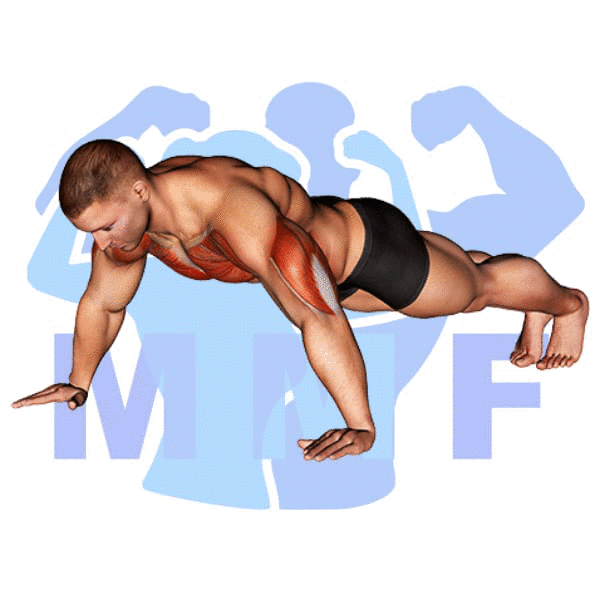Wide Push Up surely is a robust strength exercise to shape your chest. Are you searching to obtain flawless technique and get a stronger Pectoralis Major? Then read this how-to tutorial to help you commence now.
Wide Push Up Summary
- Primary Muscles: Pectoralis Major – Sternal
- Secondary Muscles: Deltoid – Anterior, Pectoralis Major – Clavicular, and Triceps Brachii
- Equipment: Body Weight
- Mechanics Type: Compound
- Force: Push
- Utility: Basic or Auxiliary

Wide Push Up Instructions
- Lie face down on the floor with your hands wider than shoulder width.
- Raise your body off the floor by extending your arms with your core straight.
- Lower your body to the floor by bending your arms.
- Extend your arms fully and push your body up.
- Continue your Wide Push Up for 10-30 repetitions.
Video Tutorial
Wide Push Up Muscles
Target (Agonist)
- Pectoralis Major – Sternal
Synergists
- Deltoid – Anterior
- Pectoralis Major – Clavicular
- Triceps Brachii
Dynamic Stabilizers
- Biceps Brachii – Short Head
Stabilizers
- No Significant Stabilizers
Antagonist Stabilizers
- Erector Spinae

Benefits of Wide Push Up
The wide push up is a great exercise for targeting the pectoralis major – sternal, the large chest muscle located on the front of the chest. This exercise activates the entire muscle group, providing a great workout to strengthen and tone the chest. The wide push up also helps to improve overall posture and upper body strength, making it a great addition to any strength training or fitness routine. Additionally, this exercise can help to improve shoulder stability and mobility, making it a great choice for those looking to reduce shoulder pain and improve shoulder health.
Tips for Performing Wide Push Up
If you’re seeking to take the wide push up to a new level, then you’re at the right place. These tips can get you more out of this amazing workout, while helping you receive all the benefits it has to offer. You’ll have the ability to strengthen your chest muscles, and minimize your chance of getting hurt. So let’s begin now and see what these tips may achieve for you.
- Keep Your Core Tight: Make sure to keep your core tight throughout the exercise to maximize the effectiveness of the push up. This will help you to engage your core muscles and prevent your back from arching.
- Lower Slowly: When performing the Wide Push Up, make sure to lower yourself slowly and with control to ensure that you are getting the most out of your workout. Doing this will also help to protect your joints.
- Keep Your Shoulders Back: Keeping your shoulders back will help to ensure that you are working the correct muscles and getting the most out of your exercise. This will also help to prevent any unnecessary strain on your neck or shoulders.
Benefits and Tips Video
Frequent Mistakes To Avoid
Avoiding common mistakes can be the difference between a successful training session and an injury when executing wide push up. Also, in order to maximize your benefits of the exercise, proper technique is required. Through preventing these frequent errors, you can improve your ability to achieve your desired results. However, take it easy, it’s not quite as difficult as it might appear. By knowing the errors to avoid and taking the right actions, you can execute the exercise securely and effectively. Let’s begin by avoiding these typical errors and add this exercise to your training regimen.
- Not engaging the core muscles: Not engaging the core muscles while performing a Wide Push Up can cause back and neck strain, leading to injury and pain.
- Elbows splaying outwards: Allowing elbows to splay outwards during a Wide Push Up reduces the effectiveness of the exercise and increases the risk of shoulder injuries.
- Not controlling the descent: Not controlling the descent of the body during a Wide Push Up can lead to a jerky and uncontrolled movement, increasing the risk of injury.
Variations and Complementary Exercises
If you want to mix up your exercise routine or are looking for a variation of the Wide Push Up, there are several alternatives that you can try. Below is a list of complementary or alternative exercises that will work similar muscles as the Wide Push Up.
Decline Push Up

The Decline Push Up is a great alternative to the Wide Push Up, as it targets the same muscle groups but with a slightly different movement. It is performed by placing the feet on an elevated surface such as a bench, box, or step while in the push up position. The decline angle shifts the weight to the arms and chest, resulting in a greater challenge for these muscles. This variation also increases range of motion, making it a more effective exercise. As such, it is a great complement to the Wide Push Up as it provides an extra challenge and variation to the routine.
Diamond Push Up

The Diamond Push Up is a great complement or alternative to the Wide Push Up. This exercise focuses on working the triceps, shoulders, and chest muscles by having the hands placed closer together than the traditional push up. To perform this exercise, start in a plank position with your hands close together so your index fingers and thumbs form a diamond shape. Lower your body until your chest almost touches the ground and then press back up. This exercise is a great way to increase the intensity of your upper body workouts.
Incline Push Up

Incline Push Up is a great complementary or alternative exercise to the Wide Push Up. This exercise requires you to place your hands slightly wider than shoulder-width apart, on a bench or elevated surface. You then lower your chest toward the bench and press back up, maintaining a straight line from your shoulders to your ankles. Incline Push Ups are an excellent way to target your chest muscles, as well as your triceps, without the strain of the floor on your wrists. This makes it an ideal alternative for those who are unable to perform regular Wide Push Ups due to injury or lack of strength.
Check Out These Top Bodyweight Exercises
Narrow Push Up

Narrow Push Up is a great alternative or complementary exercise to Wide Push Up. This exercise involves the same basic motion as a Wide Push Up, but with hands closer together on the ground. This variation targets the triceps and inner chest muscles more intensely, while still providing a full body workout. The narrower hand position also helps to build more stability in the core, creating an even stronger foundation for other exercises. With this exercise, you can expect to see improvements in shoulder and chest strength, as well as greater stability in the core.
Push Up

Push Up is an exercise that is often used as a complementary or alternative exercise to Wide Push Up. Push Up works the chest, arms, shoulders, and core muscles, while Wide Push Up primarily focuses on the chest and arms. Push Up also works the stabilizing muscles in the shoulders and core which helps improve overall posture and stability. The wider arm position of Wide Push Up helps to increase the range of motion, and thus the intensity of the exercise. Both exercises can be used to improve strength, endurance, and overall fitness.
Push Up On Grips

Push Up On Grips is a great complementary or alternative exercise to the Wide Push Up. This exercise targets the same muscles as the Wide Push Up but from a different angle. It also helps to increase upper body strength and stability. With this exercise, you place your hands on two separate grips that are slightly wider than shoulder width apart and then lower your body towards the ground. This exercise is a great way to challenge your body and work your arms, chest, shoulders, and core muscles at the same time.
Opposing Complementary Exercises
To complement the exercise Wide Push Up and ensure a balanced workout, it is important to focus on the opposing muscle groups. The following exercises will help strengthen these muscles and create a balanced workout routine.
EZ Bar Reverse Grip Bent Over Row

The EZ Bar Reverse Grip Bent Over Row is a great exercise to do in conjunction with the Wide Push Up. This exercise strengthens the upper back and works the opposing muscle group to the chest muscles worked by the Wide Push Up. This can help to build a balanced upper body, as well as providing a great challenge for the back muscles. The reverse grip of the bar also helps to reduce strain on the wrists and elbows, making this exercise easier to perform.
Lever High Row (Machine)

The Lever High Row is a great machine that is perfect for people looking to supplement their Wide Push Up exercise. This machine works the opposing muscle group by having you pull the weight towards your chest rather than pushing it away. This helps to target the muscles in your back and upper arms in a way that is not possible with just a Wide Push Up. The Lever High Row also helps to increase your overall strength and stability, which can be beneficial when performing other exercises.
Seated Cable Row

The Seated Cable Row is a great complement to the Wide Push Up exercise. This exercise works the opposing muscle groups, targeting the back muscles, including the lats and rhomboids, while the Wide Push Up works the chest muscles, including the pectorals and anterior deltoids. The Seated Cable Row helps to build strength and stability in the back muscles, which in turn helps to improve posture and balance. Furthermore, it helps to increase overall muscular endurance and core stability, aiding in injury prevention. By incorporating both exercises into your regular workout routine, you can ensure that your upper body muscles are evenly developed.
Recap
The wide push up is a great way to get fit and tone your upper body. It primarily works your chest, triceps, and shoulders, so you’ll be feeling the burn in no time! Remember to keep your back and legs straight, and don’t forget to breathe! Just make sure you don’t arch your back or tuck your elbows – those are two common mistakes people make when doing a wide push up. Now that you know the basics, it’s time to hit the gym! And if you’re looking for more fitness tips, make sure to check out our other articles – we’ve got tons of helpful advice to get you fit and healthy in no time.
References: Wikipedia | ExRx.net | PubMed.gov




